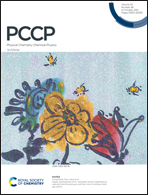Polymer solubility in ionic liquids: dominated by hydrogen bonding†
Abstract
Polymer solubility in ionic liquids (ILs) cannot be predicted by the solubility parameter approach based on the “like dissolves like” principle. According to the Kamlet–Abraham–Taft (KAT) multi-parameter polarity scale, ILs can be categorized on the basis of hydrogen-bond acidity or basicity ones. The experimental observations, that acidic ILs easily dissolve basic polymers and basic ILs dissolve acidic polymers, reflect the complementary nature of hydrogen-bonding interactions. A quantitative hydrogen-bonding analysis is proposed for predicting the solubility by taking the product of ΔαΔβ as an indicator of the competition between cross-association and self-association hydrogen bonding (H-bonding), where Δα is the difference of acidity parameters between the polymer and IL, and Δβ is the difference of basicity. This solubility criterion has been validated by the solubility data of 19 polymers (11 acidic and 8 basic) in 11 ILs (7 acidic and 4 basic). These principles based on KAT parameters can be applied to other systems dominated by hydrogen bonding.



 Please wait while we load your content...
Please wait while we load your content...